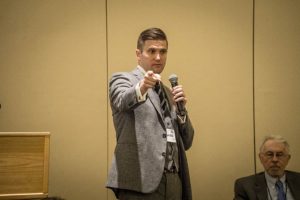Richard Spencer Pays $10,000 to Get Heckled
What bothers me most about Richard Spencer is obviously the white nationalism, but a close second is the fact that he’s defiling the name Spencer. I take everything he does very personally, from leading rallies in Charlottesville, Virginia, to prompting unnecessary conversations about whether punching Nazis is OK. I have therefore been exceptionally outraged by the events unfolding around his October 19 speech at the University of Florida (I’d like to note that no one actually invited Spencer to speak there; instead, his National Policy Institute paid $10,000 for the use of a UF facility). What’s especially unconscionable about this event (aside from the fact that he went to a college campus to talk about keeping America white) is that it cost the university upwards of $500,000 in security expenses, and Florida Governor Rick Scott declared a state of emergency in the county where the school is located.
Supporters of this necktie neo-Nazi are quick to point out that what cost the school money and what prompted Governor Scott to declare the state of emergency were fears about clashes between protestors and those attending Spencer’s talk because they find his message appealing. If the protestors would just stay home, they argue, they could “peacefully” hold their little events. To be fair, in the best argument against Nazi-punching, philosopher Slavoj Žižek made essentially the same point—that the best way to deal with someone like Richard Spencer is to act as though “even slapping him is too much of a recognition.” And for people like Spencer who count on the disproportionate attention that the media gives them and their would-be disruptors to stay relevant, it may be that the silent treatment is the most effective long-term approach.
And yet, we fear what grows in the dark. It is perhaps better that the media overstate the threat posed by white nationalists than understate it. And perhaps it’s best that protestors turn out to disrupt and drown out support for voices such as Spencer’s. What actually happened at his speech did bring a smile to my face: protesters, as expected, vastly outnumbered supporters; a large part of the audience for his talk was made up of people who, in a laudable and concerted effort, chanted “F*ck You, Spencer” to drown out his words; some Nazis were in fact punched; and the event concluded as a total loss for white nationalism. Three Texas men who attended the event in support of Spencer were charged for shooting at a crowd of people at a bus station after shouting support for Adolf Hitler. Fortunately no one was injured, and it’s worth noting that two of the men already had ties to extremist groups. Will Spencer gain new supporters from this event? It’s hard to believe that could be the case, and I think it’s important to understand what “supporters” would even look like.
I disagree with the idea that violent clashes and canceled appearances gain people like Spencer ideological support. People often say that attempts at suppression or the use of the heckler’s veto play into their hands, but I think the truth is much more complicated. To be sure, the media attention given to, say, protests at UC Berkeley may temporarily provide a controversial figure with national coverage, but that’s the fault of the media and not the protestors. Additionally, it’s not an effective recruitment tool—what the media is reporting on is the unpopularity of say, Richard Spencer’s ideas, and the social stigmatization that comes with supporting them. This makes it unlikely that his cause will be viewed sympathetically, and additionally, I find it hard to believe that there are a large number of people with white nationalist tendencies who wouldn’t have heard of Spencer until a national news outlet reported on protests at one of his appearances. Do you really believe—especially in the Trump era, that these people are relying on CNN for all their news?
And so, the “supporters” that perceived popular censorship of Spencer and his ilk might create are simply free speech crusaders. They aren’t people who give credence to his ideas, but rather believe that freedom of speech should be interpreted to include even the foulest of ideas. They create, in effect, a conflict without end whereby the rights of people like Spencer to continue spewing hate become more entrenched, but as long as the opposition remains (and there are always people ready to shout down white nationalists at their own events) they don’t make any progress. Philosopher Karl Popper describes the paradox of toleration, where unlimited free speech actually allows extremists to take over society; overwhelming protests like the one seen at the University of Florida act as a natural check on such extremism when the law fails to provide one. So, all’s well that ends with a Nazi being humiliated at his own event.

